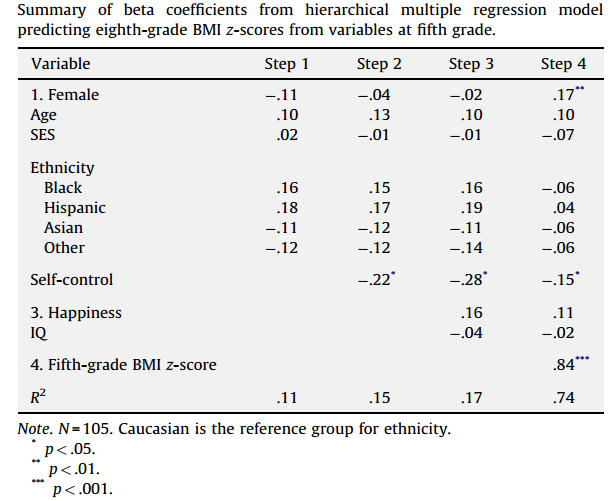There might be affiliate links on this page, which means we get a small commission of anything you buy. As an Amazon Associate we earn from qualifying purchases. Please do your own research before making any online purchase.
Do levels of self-control in young children predict future weight status?
Maybe.
The level of self-control contained by an eight-grader four years earlier explains 8% of the variance of their weight. But after controlling for their BMI four years earlier, self-control explains just 1% of the variance of their weight.
This suggests that self-control starts to influence weight at an early age, because in addition to genetic and environment information, fifth-grade BMI contains most of the same information as fifth-grade self-control. However, that suggestion should be tested before self-control interventions are given to at-risk children; because, at least for now, the impact of self-control on weight among children seems to be statistically significant but still small.
Click here to learn more about self-control.
Study Details
Hypothesis: The level of self-control contained by a fifth-grader will predict their weight status four years later.
Method: 105 fifth grade students completed a number of questionnaires and, each year, had their height and weight measured.
Measures: A number of self-control measures were compared against changes in body mass index.
A composite self-control measure was constructed through the responses of two informants – parents and classroom teacher, and the self-report of the student, on a self-control questionnaire.
One measure of self-control, one measure of delay of gratification, and another measure of delay of gratification were assessed.
A body mass index was calculated for each student using data from a nurse, who measured the height and weight of each student each year.
Data for a number of confounds was collected, including demographics, intelligence, and happiness.
Results: The hypothesis was partially confirmed.
After controlling for demographics, intelligence, and happiness, self-control during fifth grade was found to predict future weight gain. However, the incremental predictive ability of self-control was small – r=-.12, r2 = 1%.
Before including fifth-grade BMI, the predictive ability of self-control was much larger – r=-.28, r2 = 8%.
Concerns: The sample and effect size were both small.
Questions: At what point does the set-point theory of weight begin to make useless or less useful efforts to increase self-control? Would separating out high-risk children increase the predictive ability of self-control (e.g. my levels of self-control seem to have no impact on my weight, which is highly stable)?
How to be Happy: 57 Ways to Find True Happiness
Duckworth, A. L., Tsukayama, E., & Geier, A. B. (2010). Self-controlled children stay leaner in the transition to adolescence. Appetite, 54(2), 304-308

